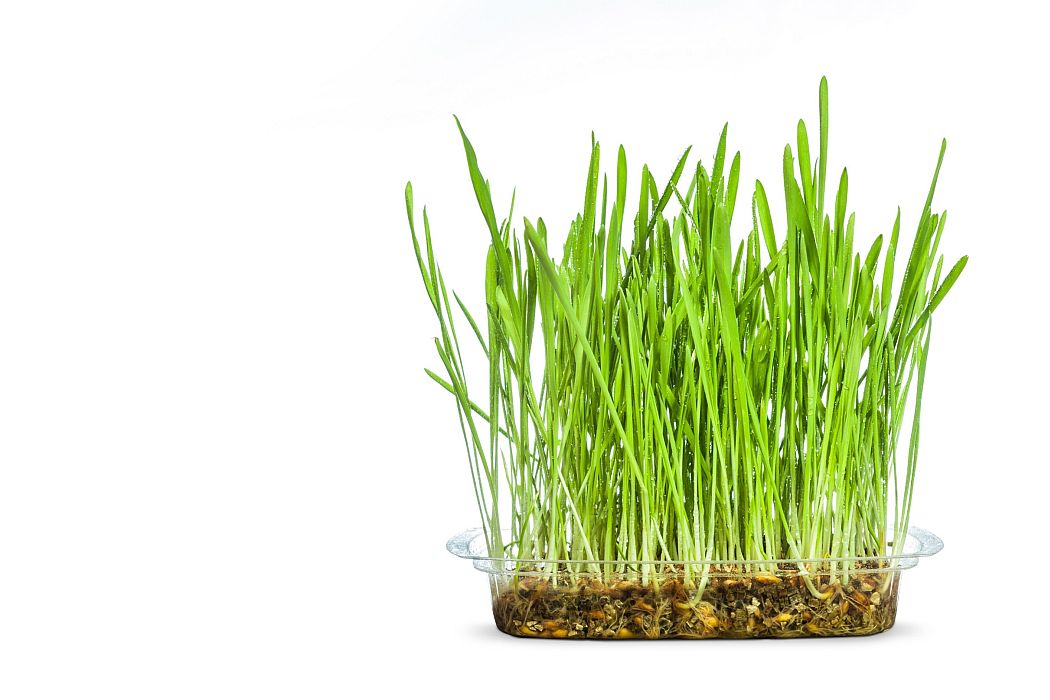Molecular farming startup Plantopia (formerly Pigmentum) aims to establish pilot-scale production of casein proteins in sprouted oats in the second half of this year, an approach it claims can enable cost competitive indoor production of animal-free dairy proteins at scale.
The Israeli startup—founded by Amir Tiroler, Prof. Alexander Vainstein, and Tal Lutzky in 2018—originally focused on lettuce as a production platform. However, it has since switched to oats as they can deliver higher expression levels of all four casein proteins (alpha S-1, alpha S-2, beta, and kappa), Lutzky told AgFunderNews.
Sprouted oats—which are used as fodder for some animals—can produce casein proteins more rapidly than crops such as soy and corn (in days rather than weeks or months) and present fewer regulatory issues and allergen concerns given that they can be grown indoors, said Lutzky.
While some players in the “animal-free dairy” field are producing and combining a couple of casein proteins, Plantopia is producing all four casein proteins in separate plants and then combining them with salts and minerals post-extraction to trigger them to self-assemble into micelles, the structures formed naturally in cow’s milk that create the functionality customers expect from dairy.
The aim is to replicate the process taking place in a cow, in which casein undergoes post-translational modifications that impact the formation and stability of casein micelles and can significantly alter their functionality in food applications, he added.
“We have filed patent applications covering several aspects of our technology, including the micellization process and the post translational modifications of the proteins that allow them to be functional.”
Pilot scale production in the second half of 2025
According to Lutzky: “[Producing casein proteins in] lettuce is more cost effective than precision fermentation, but sprouting oats is an even more efficient low-cost way to produce biomass in very high scales without high amounts of energy or lighting. The plan is to get to pilot scale in H2 that will allow us to produce substantial quantities of casein powder a day.”
Plantopia has developed two approaches to enabling oats to produce dairy proteins. The first involves creating transgenic plants that pass on the ability to express casein to their offspring. The second uses a transient expression system, where wild-type plants are temporarily induced to produce casein, but this trait is not inherited by future generations.
The latter presents fewer regulatory challenges as genetic material introduced via the agrobacterium is not stably integrated into the plant’s genome and is only temporarily expressed, he explained.
Similarly, the proteins emerging from this transient process could be classified as non-GMO depending on the jurisdiction, provided the final product does not contain agrobacterium and recombinant DNA leftovers, added Lutzky, who plans to go through the Generally Recognized as Safe (GRAS) process to take the products to market in the US.
Purity levels
According to Lutzky, it is not necessary to achieve 100% purity during the downstream processing stage for the casein proteins to be functional, which helps to keep costs down. As such, Plantopia’s product is about 70-80% casein, with the rest comprising oat protein, fibers and other plant materials, which are consumer-friendly, he said.
The market opportunity
Noah Klein, who was recently hired as chief commercial officer at Plantopia as it moves from the R&D to the commercialization phase, acknowledged that the animal-free dairy space has not yet set the world on fire, and said buyers want to know two things: “It’s a case of show me quality; show me price. Nobody cares how you get there.
“But existing approaches [via precision fermentation] are falling short on price,” he claimed. “They’re expensive to set up and expensive to operate. The brilliance of molecular farming is that it marries both those imperatives [quality and price] in order to be successful in the marketplace.”
But why are traditional dairy companies and CPG companies interested in animal-free dairy in the first place?
There are several market drivers, including a desire to reduce greenhouse gas emissions, said Klein. There is also ongoing interest in reducing reliance on animal products, especially in the cheese category, but frustration with plant-based alternatives, which do not replicate the melt and stretch of dairy cheese.
Plantopia, which has “achieved a huge amount” on a relatively modest sum to date ($7.5 million) is currently fundraising and aims to scale up through partnerships, said Lutzky. “There has been disappointment among investors in this space, and I can fully understand it because there have been a lot of promises and not too much delivery. But we believe we can produce functional casein proteins in a more cost effective, scalable way.”

What is molecular farming?
There are varying definitions, but companies deploying plant molecular farming are typically genetically engineering plants to make them produce something they wouldn’t typically make (think vaccines made in tobacco, growth factors made in barley, dairy proteins expressed in soybeans, chymosin made in safflower).
Rather than modifying the plant to confer a beneficial agronomic property such as disease resistance, stress tolerance, increased yields, or improved nutrition (e.g., purple tomatoes), molecular farming companies use plants like bioreactors in order to produce specific high-value ingredients.
In recent years, multiple players have emerged producing so-called ‘animal-free’ proteins through molecular farming, which they argue is more sustainable, ethical, and potentially more efficient than industrialized animal agriculture.
Players to watch in the molecular farming space include:
- Dairy proteins: Mozza, Alpine Bio (USA), Miruku (New Zealand), IngredientWerks (USA), Veloz Bio (Spain), Pigmentum, Finally Foods (Israel)
- Growth factors: Bright Biotech (UK), ORF Genetics (Iceland), BioBetter (Israel), Tiamat Sciences (USA), Core Biogenesis (France)
- Meat proteins: Moolec Science (registered in UK), IngredientWerks (USA), Kyomei (UK)
- Egg proteins: PoLoPo (Israel), Veloz Bio (Spain)
- Misc – incl sweet proteins, Mogroside V, enzymes, albumin: GreenLab (USA), Elo Life Systems (USA), Forte Protein (USA)
- Vaccines, therapeutics: Baiya Phytopharm (Thailand), Protalix Therapeutics (Israel), Bio Applications (Korea), KBio (USA), Eleva (Germany), InVitria (USA), Agrenvec (Spain) Diamante (Italy)
Further reading:
Egg proteins… in potatoes? Molecular farming startup PoLoPo makes the case





